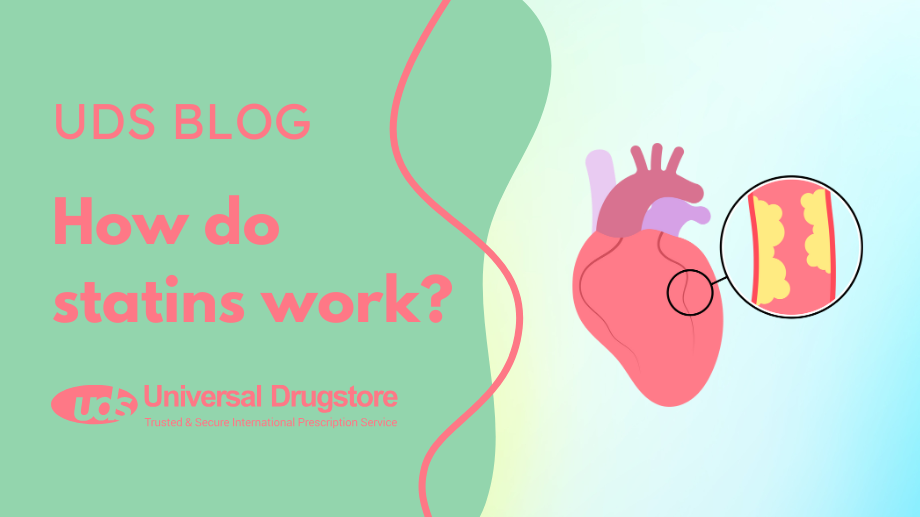How do statins work?

More than 400 million Americans take a class of cholesterol-lowering drugs called statins, making them the most prescribed medications in the country. While some of the cholesterol in your blood comes from food, around 75% of it is made by your liver. Cholesterol is a waxy, fat-like, waxy substance that is found in every cell of your body.
The two types of cholesterol are high-density lipoproteins (HDL) and low-density lipoproteins (LDL). HDL is known as good cholesterol and it helps remove excess cholesterol from your body. LDL is known as bad cholesterol. High cholesterol levels can lead to fatty deposits in your blood vessels and arteries. If not treated, the deposits can build up, restricting blood flow and increasing your risk of heart attack or stroke. If caught early, cholesterol build-up can be controlled by healthy lifestyle changes, such as a healthy diet, regular exercise, and quitting smoking. If these changes are not effective, your healthcare provider may prescribe a statin to prevent build-up and further damage.
Statins help lower LDL cholesterol by blocking the enzyme in your liver that is involved in making it. Statins also help your liver remove cholesterol that is already in your blood. Reduced production and increased clearance help lower the amount of cholesterol in your blood. In addition to lowering your LDL-cholesterol levels, statins can lower your triglycerides too. High triglyceride levels have been linked to liver disease, heart disease, and type 2 diabetes. Finally, statins may increase your HDL cholesterol levels, which can further reduce your blood cholesterol levels.
Keep reading as we discuss other important information you need to know about statins and answer some frequently asked questions.
Statin FAQs
What are statins?
Statins, which are also known as HMG CoA reductase inhibitors, are a class of medicines used to lower cholesterol. They were developed in the 1980s from compounds found in mold and fungi. Statins target an enzyme in your liver that regulates cholesterol production. Some statins can decrease your low-density lipoprotein (LDL) cholesterol by 50% or more. Different types of statins are available on the market and many have generic versions, which cost less. Some examples of FDA-approved statin drugs include:
- Lipitor (atorvastatin)
- Zocor (simvastatin)
- Crestor (rosuvastatin)
- Livalo (pitavastatin)
- Pravachol (pravastatin)
- Lescol XL (fluvastatin)
- Mevacor (lovastatin)
Who can take statins?
Not everyone who has cardiovascular disease will be prescribed a statin. Guidelines from the American Heart Association and American College of Cardiology recommend that these people may benefit from taking a statin:
- People who do not have heart disease, but are at a high risk of heart disease. Risk factors include high cholesterol, high blood pressure, kidney disease, or diabetes.
- People who have heart disease related to atherosclerosis. This includes those who have had a heart attack, stroke, peripheral artery disease, or coronary artery surgery.
- People with very high LDL cholesterol that is not controlled by lifestyle changes.
- People with inherited conditions that cause high cholesterol levels.
What are the side effects of statins?
While most statins are effective and well-tolerated, they can cause some side effects. Common side effects include:
- Muscle pain or aches
- Headache
- Diarrhea
- Dizziness
- Indigestion
- Constipation
- Fatigue
- Nausea
- Bloating
- Low platelet levels
- Trouble sleeping
Some other possible side effects reported with statin therapy include:
- Memory loss or confusion
- High blood sugar levels
- Skin rash
- Pins and needles sensation
- Hair loss
- Erectile dysfunction or lowered sex drive
Rare but serious side effects include:
- Serious allergic reactions such as anaphylaxis
- Liver damage or liver failure
- Severe muscle inflammation and damage (rhabdomyolysis)
- Complications during pregnancy or breastfeeding
If you experience symptoms such as yellowing of the skin or eyes, stomach swelling, dark-colored urine, or severe muscle pain, seek medical attention immediately.
What are some alternatives to statins?
If you are unable to tolerate statins or they are not working well, your healthcare provider may suggest alternatives such as:
Do you still need to diet and exercise while taking a statin?
Yes. Even while taking a statin, you should eat a healthy diet, get regular exercise, quit smoking, and limit alcohol. These lifestyle changes support the medication and improve your heart health overall.
What are the benefits of statins?
Statins, when taken as directed, can significantly reduce your risk of a heart attack or stroke. They can also reduce your need for angioplasty, surgery, or a stent. Statins offer more benefits the longer you take them and can cut your cardiovascular risk by up to 50%.
Sources
- American Heart Association
- CDC
- Newman, C., Preiss, D. et al. (2018). Statin Safety and Associated Adverse Events: A Scientific Statement From the American Heart Association. Arterioscler Thromb Vasc Biol. 2019;39:e38-e81.


